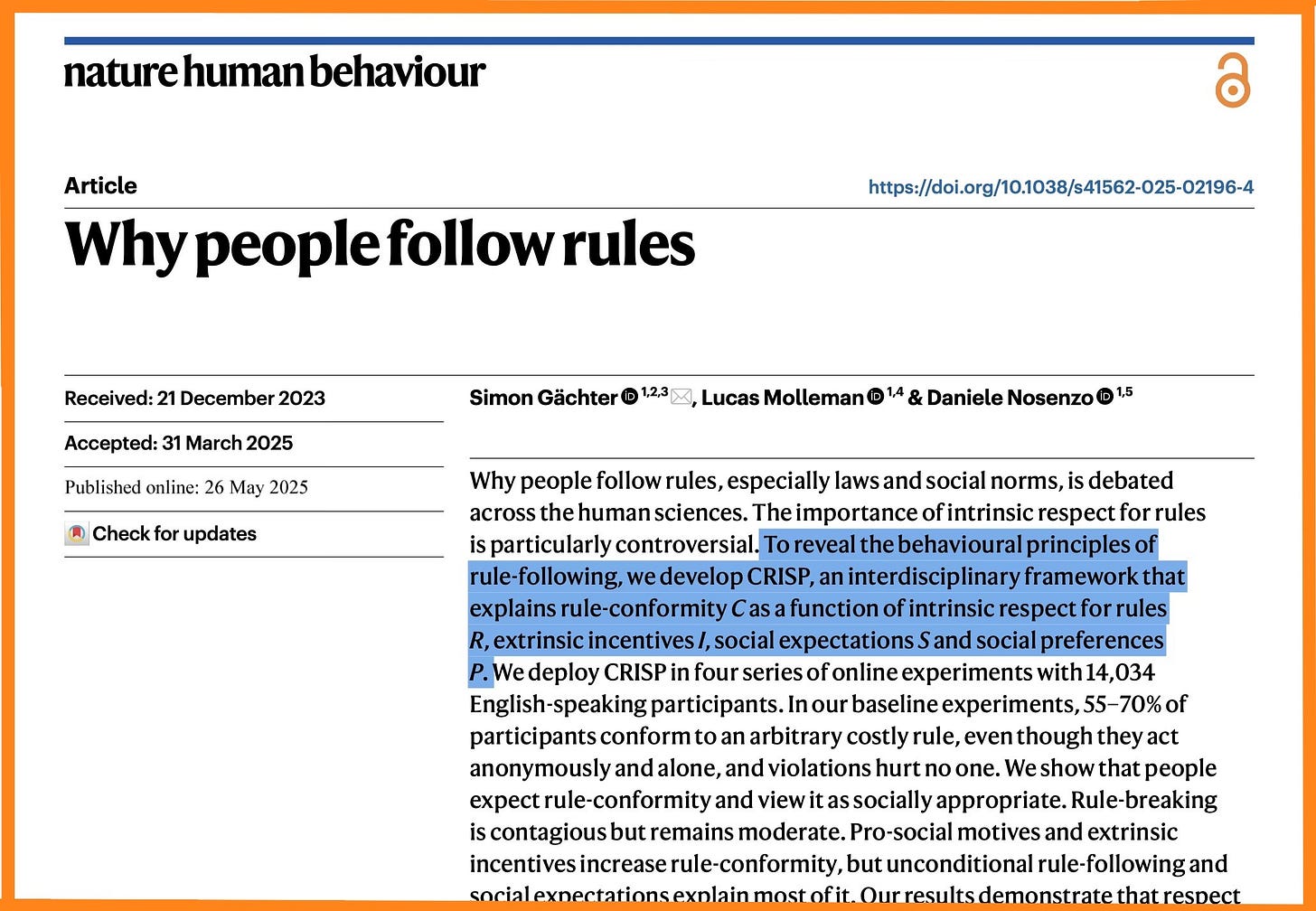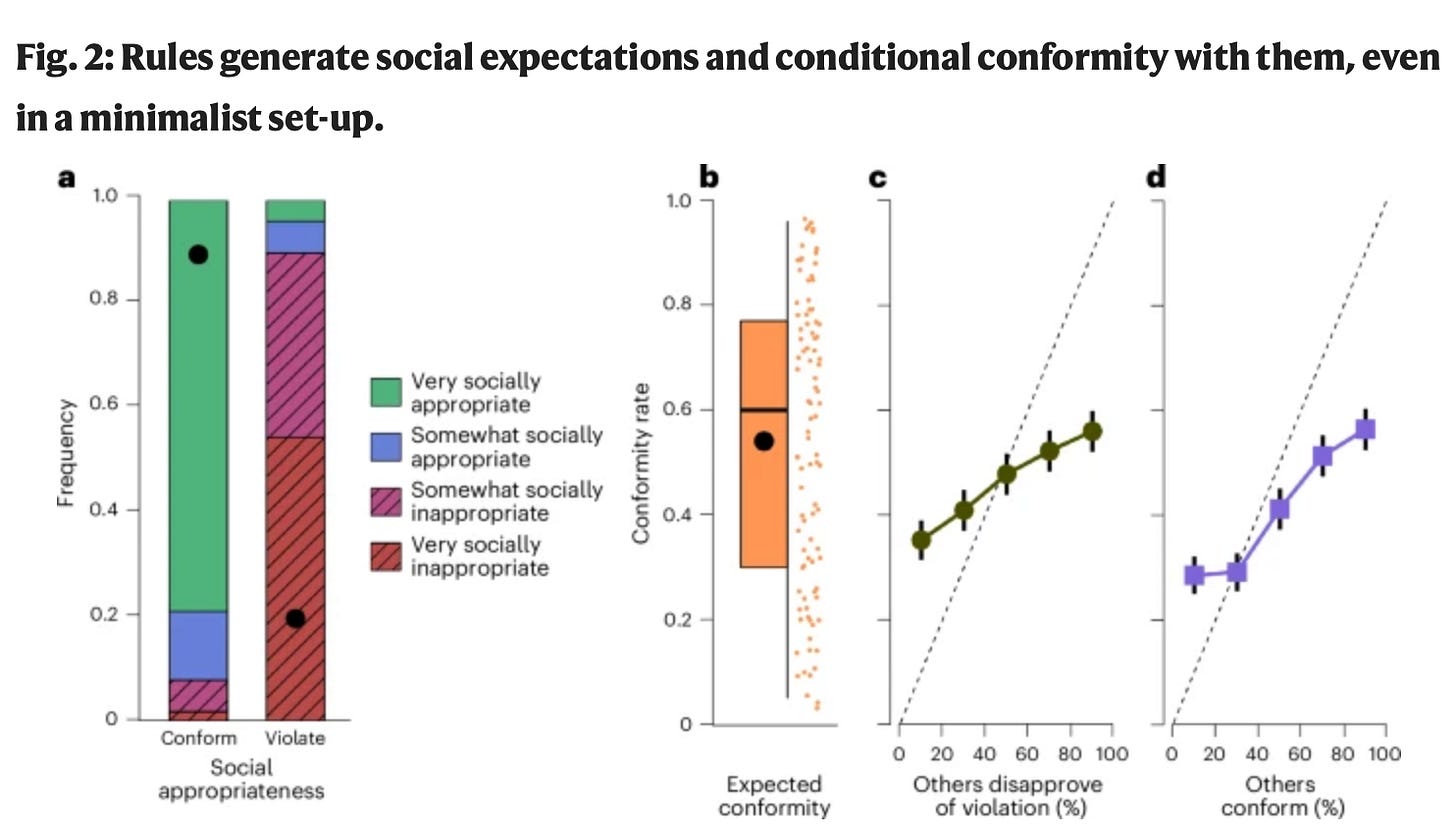Why do people follow rules?
There are many rules in organisations that are in place to prevent harm and create harmonious cooperation. So how do we help make sure employees follow rules?
Rules are everywhere, including organisations. They’re essential for cooperation and social cohesion, which is why it is so important to understand how people react to them. Simon Gächter, Lucas Molleman and Daniele Nosenzo introduce a new framework to summarise the behavioural channels that predict conformity C) with rules: intrinsic respect for rules (R), extrinsic incentives (I), social expectations (S) and social preferences (P) — CRISP.
Our key takeaways from the paper are as follows:
"Rules classify actions as permissible or impermissible and can be formal or informal, written or unwritten, flexible or rigid, clear or ambiguous, explicitly stated or implicitly assumed, and enforced or not enforced. Rules shape everyday practices in personal, professional and political affairs in numerous ways, such as in rules that coordinate behaviour and rules that govern social relations..." — and are especially essential to prevent harm done by organisations and to ensure people can work well together.
"Despite the omnipresence of rules in everyone’s lives, the fundamental reasons why people follow them are not well understood."
“In CRISP, the most basic reason for rule-conformity is that it may occur for unconditional (intrinsic) respect for rules: people might conform out of a sense of duty to obey a rule.” — if this is the case, simply introducing rules to achieve a certain outcome will have a big impact on evoking a certain behaviour and compliance.
“many economists neglect intrinsic motives and instead argue that conformity with rules results from extrinsic incentives that are high enough.” — some great food for thought that could save organisations some expenses.
“These results suggest that intrinsic respect for rules and social expectations are the key motives underlying rule-following; other-regarding concerns and extrinsic incentives, while enhancing rule-following, are not necessary to achieve high rates of rule-following in the first place."
We think this is a fascinating piece of research, and think further research should explore how and by who the new rules are communicated to test if this has an impact on rule following in organisations.
A big read: Complicit: How We Enable the Unethical and How to Stop (2022) by Max Bazerman
This paper also made us think of much of Max Bazerman’s research. Bazerman is a renowned thinker in the field of behavioural science and a Professor of Business Administration at the Harvard Business School specialised in ethics and organisational behaviour. One of his recent books Complicit is a fascinating exploration of how and why people can become complicit in unethical behaviour, especially in organisations.
Some of our key takeaways from the book are as follows:
In the last few decades, behavioural scientists’ research has focused on understanding the '“surprisingly frequent bad behaviour of ordinary people” instead of the ‘bad apples’. (p.9)
“We may not know how to deter the truly evil from engaging in their actions, but—by stoping those around them from enabling and participating— we can halt their actions.” (p.9)
“Leaders are different from other professionals in that they are responsible not only for their own decisions but also for the decisions of those they lead.” (p.201)
“Too many people, including leaders, view the design and structure of their organisation as relatively fixed. But people created the organisation, and leaders have the power to change key features of it.” (p.204)
Many more interesting lessons to be found in the book for people at all levels of organisations as well as anyone interested in fighting wrongdoing in the workplace.
What’s happening and what are we thinking about at MTN? Coming this digest from…
I’ve been reading extensively about the role flexibility has to play in workplace satisfaction. There’s an interesting paradox where rigid work-from-office policies are intended to drive performance, but often do the opposite. It’s a nuanced pattern that varies from organization to organization, but overall it seems that flexibility drives work satisfaction which drives productivity and performance. On a personal note, I’ve found that MoreThanNow’s openness to flexible working arrangements has significantly impacted my ability to perform to my best ability.





